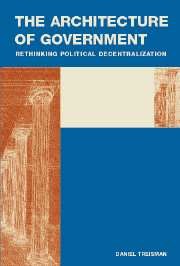Book contents
- Frontmatter
- Contents
- List of Figures and Tables
- Preface
- Glossary of Main Notation Used
- 1 INTRODUCTION
- 2 THE POLITICAL PROCESS
- 3 ADMINISTRATIVE EFFICIENCY
- 4 COMPETITION AMONG GOVERNMENTS
- 5 FISCAL POLICY AND REDISTRIBUTION
- 6 FISCAL COORDINATION AND INCENTIVES
- 7 CITIZENS AND GOVERNMENT
- 8 CHECKS, BALANCES, AND FREEDOM
- 9 ACQUIRING AND USING KNOWLEDGE
- 10 ETHNIC CONFLICT AND SECESSION
- 11 DATA TO THE RESCUE?
- 12 CONCLUSION: RETHINKING DECENTRALIZATION
- References
- Index
- Titles in the series
Preface
Published online by Cambridge University Press: 05 June 2012
- Frontmatter
- Contents
- List of Figures and Tables
- Preface
- Glossary of Main Notation Used
- 1 INTRODUCTION
- 2 THE POLITICAL PROCESS
- 3 ADMINISTRATIVE EFFICIENCY
- 4 COMPETITION AMONG GOVERNMENTS
- 5 FISCAL POLICY AND REDISTRIBUTION
- 6 FISCAL COORDINATION AND INCENTIVES
- 7 CITIZENS AND GOVERNMENT
- 8 CHECKS, BALANCES, AND FREEDOM
- 9 ACQUIRING AND USING KNOWLEDGE
- 10 ETHNIC CONFLICT AND SECESSION
- 11 DATA TO THE RESCUE?
- 12 CONCLUSION: RETHINKING DECENTRALIZATION
- References
- Index
- Titles in the series
Summary
This book has been a long time in the making. It began as an empirical project. I wanted to see what difference decentralized political institutions make for economic performance and the quality of government. The common presumption in Western democracies seemed to be that devolving power to autonomous local governments produced a number of important benefits. In the developing world, international aid agencies were backing reforms to decentralize responsibilities and resources in an ever-lengthening list of countries. Studying the politics of postcommunist Russia and reading about Latin America, I had grown skeptical that powerful local governments were quite as unmixed a blessing as was generally believed. I thought I would examine the empirical record.
Having collected data about the structure of government in countries around the world, I set aside what I thought would be a couple of months to work through the logic of the arguments about decentralization I would use the data to test. Five years went by. Along the way, I became convinced that – with one exception – there was no compelling reason to think that decentralized political institutions have any predictable effect at all. The one more persuasive argument – that some kinds of decentralization slow the pace of policy change – had no implications about whether decentralization was good or bad: It could be either, depending on what kind of change was being prevented.
- Type
- Chapter
- Information
- The Architecture of GovernmentRethinking Political Decentralization, pp. xiii - xivPublisher: Cambridge University PressPrint publication year: 2007

